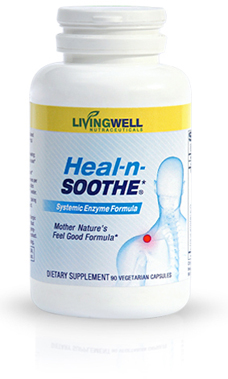The Symptoms, Causes & Top Natural Cures
 Your gastrointestinal (GI) tract, which includes your stomach and intestines, has one of the most important roles in your body.
Your gastrointestinal (GI) tract, which includes your stomach and intestines, has one of the most important roles in your body.
It’s responsible for taking in food, digesting it and extracting energy and nutrients so your body can function, and then expelling the waste products from your body. Your GI tract even releases hormones that are involved in the digestive process.
When your GI tract becomes inflamed, it can lead to abdominal pain and cramping, diarrhea (sometimes bloody), ulcers and reduced appetite. If the inflammation is chronic, this is a hallmark symptom of inflammatory bowel disease (IBD), one of the five most prevalent gastrointestinal diseases in the United States.[i]
Inflammation of the Gastrointestinal Tract: The Two Primary Conditions
If you have chronic inflammation of the gastrointestinal tract, you could have IBD, which primarily includes:
- Ulcerative colitis: Inflammation is usually on the innermost lining of your large intestine (colon). Symptoms include bloody diarrhea, abdominal cramping and unintended weight loss.
- Crohn’s disease: Inflammation can occur anywhere along the lining of your digestive tract. Symptoms include diarrhea, abdominal pain and sometimes malnutrition.
Over time, IBD can lead to serious complications including bowel obstruction, ulcers, malnutrition and colon cancer. Arthritis, kidney stones, gallstones, osteoporosis, and inflammation in other parts of the body are also associated with IBD, and depression is linked to general gastrointestinal inflammation. The causes of IBD are unclear, but there are noted risk factors that include:
- Family history
- Cigarette smoking
- Poor diet, including consumption of refined foods
- Use of pain relievers such as ibuprofen, naproxen and aspirin, oral contraceptives or the acne medication isotretinoin
- Living in an urban area, which suggests an environmental connection
Leaky Gut Syndrome Also Linked to GI Tract Inflammation
Chronic inflammation is also linked to a condition known as leaky gut syndrome (sometimes referred to as increased intestinal permeability), in which bacteria, toxins, undigested proteins and fats and other “waste” leaks from your intestines into your bloodstream. This can trigger an autoimmune reaction that causes all sorts of gastrointestinal problems (like gas, bloating and cramping). IBD is also marked by an abnormal immune response that leads to chronic inflammation.
You might be surprised to learn that a clogged colon can also cause your gastrointestinal tract to become inflamed, leading to leaky gut, inflammation, an inability to absorb and synthesize key nutrients, and, ultimately, a worsening of brain and organ function.
In just 2 capsules daily for 30 days, Natural Cleanse can help to flush your colon clear of toxic build up (including impacted fecal matter, toxins, bacteria and parasites) while soothing the inflammation of your GI tract lining to reduce leaky gut. Natural Cleanse contains herbal remedies like buckthorn bark, ginger root, and milk thistle extract combined with psyllium husk and a patented probiotic blend that helps rebalance your vital gut microflora and is clinically proven to improve digestive function.
5 Tips for Relieving Inflammation of the Gastrointestinal Tract
If you’re diagnosed with IBD, or suspect you have inflammation of your gastrointestinal tract, diet and lifestyle changes can often be effective in relieving your symptoms and the underlying inflammation. Before resorting to anti-inflammatory drugs, try:
 5. Limiting refined foods and sugar, which are pro-inflammatory, and focus instead on eating an anti-inflammatory diet.
5. Limiting refined foods and sugar, which are pro-inflammatory, and focus instead on eating an anti-inflammatory diet.
4. Using an elimination diet to find out which foods may be making your symptoms worse
3. Avoiding smoking, which is not only inflammatory but also linked to IBD
2. Embracing relaxation strategies, as stress can cause and exacerbate inflammation
1. Trying the all-natural anti-inflammatory Heal-n-Soothe, which has 12 natural inflammation-fighting ingredients, like Boswellia and turmeric, both of which have demonstrated therapeutic effects for IBD.[ii],[iii]

